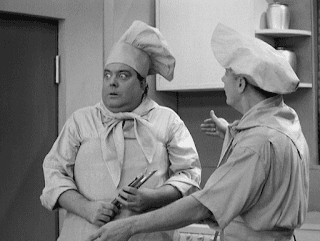Welcome to Part Two of this fun little series. We've all used the below phrases, but how many people know why? It's always seemed strange to me that we say these phrases that don't actually say what we mean. For instance, take the phrase "at the drop of a hat." I'm not dropping an actual hat, but you know it means doing something quickly as if I were racing.
So, where did all these come from?
Keep reading to learn about the history behind ANOTHER 20 common phrases.
By the way, "drop of the hat" comes from foot races in the 1800s. Someone would signal the start of the race by taking their hat off and swooping their hand toward the floor as if they were "dropping their hat."
1. "That Costs an Arm and a Leg!"
Meaning- It's very expensive.
Origin - Original photographers required significant time and effort to set up photos, so most pictures were taken from the shoulders up, or "busts." If you wanted a full-body photo, it would cost extra to include "your arms and legs" in the image, hence the term.
2. "The Graveyard Shift"
Meaning - Starting work late at night, which often lasts until morning.
Origin - Old wives' tales say that during the 1800s, many of the wealthy folks in Europe began to be afraid of being buried alive. So, Count Michel de Karnice-Karnicki, one of the fearful, developed coffins with strings that would ring bells placed above ground. Should someone wake up to find themselves buried alive, they could ring the bell to alert the cemetery watchmen. These watchmen began working the newly created night shift at "the graveyard" to listen for these bells, among other tasks.
It is also supposedly the source of the terms "dead ringer" and "saved by the bell."
3. "Bury the Hatchet"
Meaning - To make amends or call a truce.
Origin - This term comes from the Native American tribes, who, by custom, would literally bury their weapons during a peace treaty ceremony as a sign of peace. This act signaled the official end of the conflict.
4. "By the Skin of My Teeth"
Meaning - Used to describe a situation in which one has barely escaped, survived, or achieved.
Origin - This term originated from The Bible. Job 19:20 says, "My bone cleaveth to my skin and to my flesh, and I am escaped with the skin of my teeth" (King James Version). Since teeth don't actually have any skin, the phrase is meant to survive by the thinnest of margins.
5. "Cut To the Chase"
Meaning - Get to the point quickly.
Origin - Early silent films got into the habit of containing long-winded dialogues that set up the story before the exciting "chase" scenes. Impatient audiences began demanding movie studios skip the build-up and get right to the action or "cut to the chase (scene)."
6. "Hit the Sack"
Meaning - To go to sleep.
Origin - This term was created simply because old mattresses were just sacks filled with hay, feathers, or other stuffing materials. To fluff them up before bed, like pillows today, you'd "hit the sack" to make them softer. Eventually, the term just became used for going to bed.
7. "Playing Second Fiddle"
Meaning - The feeling of being less important than someone else.
Origin - When an orchestra assigns positions to its musicians, the "first" chair seated on the end is most importantly reserved for the best musician of that specific instrument. Seated next to them is the Second Violinist, or Second Fiddle. The title makes it appear to be only a supporting role and deemed less important.
8. "Bite Off More Than You Can Chew"
Meaning - To take on more than possible or to overwhelm oneself with too much.
Origin - Chewing tobacco rose to immense popularity in America during the 1800s. Sometimes, people would bite off more of the "wad" than they could comfortably chew and would occasionally choke on their tobacco, leading to the phrase "bit off more than they can chew."
9. "Fly Off the Handle"
Meaning - To act suddenly in a reckless or dangerous manner.
Origin - Back in, "the day," many tools were made by nailing the metal tool to a wooden stake. Frequently, when the tool broke, the metal parts would literally fly off the handle. These flying heavy and sharp metal objects would be dangerous to those nearby. So when people would occasionally act recklessly, they were said to "fly off the handle."
10. "The Short End of the Stick"
Meaning - To be placed in a worse position or receive unfavorable treatment compared to others.
Origin - The most likely origin for this phrase comes from centuries ago when carrying heavy loads mounted on rods (or sticks). In physics class, we learned that a longer fulcrum achieves more than a shorter one when trying to gain leverage over an object. For example, if you've ever changed a tire with a stuck lug nut, you'll know the longer the tire iron, the easier it becomes to turn the lug. When carrying a load mounted on sticks, the leverage works against the one holding the "short end," meaning they must do extra work and lift more of the load.
11. "Nimrod"
Meaning - An idiot, moron, or as Bugs Bunny says, "what a maroon."
Origin - In the Books of Genesis, there was a mighty hunter named Nimrod. He was the great-grandson of Noah and was described as "a mighty hunter before the Lord." Thousands of years later, when the cartoon character Bugs Bunny described his enemy Elmer Fudd (a hunter) as "Nimrod," children all over the world didn't catch the Biblical reference and assumed it meant idiot or moron. By the next morning, they were calling each other "nimrod" on the playground, and the term stuck. Poor Nimrod.
12. "Throwing Caution to the Wind"
Meaning - To act carelessly or recklessly in desperate situations.
Origin - This is one of many nautical references you'll find in the rest of this article. Centuries ago, when sailors found themselves in desperate situations, such as the boss tossing or heaving violently in a storm, they would release the ropes on the sail masts "into the wind." This would give up all control (or caution) over where the boat was going and let the weather do what it wanted, hoping it would smooth out the ride faster.
13. "Chew the Fat"
Meaning - To have a casual conversation, usually gossip or small talk.
Origin - When sailors or soldiers of the 18th and 19th centuries got together in port and swapped stories, they'd often eat pieces of inexpensive, tough, salted pork known as "fat back." Hence, the term "chewing the fat" became popular for gossiping or having idle conversations.
14. "Making Money Hand Over Fist"
Meaning - Earning money quickly.
Origin - When fishermen of centuries past had a good catch, they would pull the ropes on the nets rapidly... hand over hand... to quickly bring in the large number of fish that would lead to a significant payday. This eventually created the term "hand over fist" to move quickly to make money.
15. "Under the Weather"
Meaning - Feeling sick or unwell.
Origin - When sailors would become generally ill or seasick during large swells caused by storms, they were sent below deck to rest. While resting in their bunks below, they would be out of the harsh elements or, simply put, "under the weather."
16. "Feeling Groggy"
Meaning - Feeling ill, hung-over, confused, nauseous, or dizzy.
Origin - Old sailors would drink what was known as "grog." Following England's conquest of Jamaica in 1655, rum replaced beer and brandy as a sailor's drink of choice. The customary ration of eight pints of beer was replaced with one half-pint of spirits. After nearly 100 years, British Vice-Admiral Edward Vernon wanted to limit the effects of alcohol, so he ordered that the daily half-pint of rum be mixed with one imperial quart of water, making it more water than alcohol. That watery mixture accelerated the drink spoilage to prevent hoarding by sailors, but more importantly, it diluted its effects on the sailors. This new drink mixture was called "grog." Despite this, sometimes men would find a way to have too much grog and wake up in the morning with a hangover they started describing as "feeling groggy."
17. "Three Sheets To The Wind"
Meaning - Drunk as a skunk.
Origin - After a night of drinking grog and other libations, the sailors could get a little tipsy. This would lead to people spending a drunken night stumbling and flailing around like loose sails on a ship. On a big ship, the "sheets" are a set of (usually) three ropes that go from the bottom of each sail to the stern, holding it down. When those ropes would come loose, they would flap around and flail in the wind, like a drunken sailor, coining the term "three sheets to the wind."
18. "Slush Fund"
Meaning - A fund or account used for miscellaneous income and expenses.
Origin - Back in the olden days, the cook on a ship would scrape out the fat, oils, and other "slush" at the bottom of the pot and store it. It could be used for numerous things, such as making candles and various lubricants, or even very cheap food for the poor. When they arrived in port, they'd sell the "slush" items and use those funds on things they needed to purchase for the crew and ship. This eventually created the phrase "slush fund" because the slush was quite literally funding things.
Meaning - Slang for gossip.
Origin - The cask or barrel that sailors got their drinking water was called a scuttled butt. The butt (a cask) was scuttled (which means a shallow opening) by making a hole in it so the water could be withdrawn. As sailors and pirates would gather around the scuttlebutt to get a cool sip of water, they'd hang around and exchange stories or the day's gossip. Eventually, just the act of chatting by the water barrel was nicknamed "scuttlebutt." It was the original water cooler conversation!
20. "Show Your True Colors"
Meaning - Identifying oneself truthfully.
Origin - During the 16th and 17th centuries, naval battleships would fly multiple flags to confuse the enemy. Flying a "friendly" flag would often allow you to get close enough to attack your foe in a surprise maneuver. However, warfare rules were agreed upon, and you must fly your true flag before firing upon an enemy. This became known as "showing your true colors."
... And one (sort of) apropos extra!
21. "A Baker's Dozen"
Meaning - A dozen is 12, but a baker's dozen is 13.
Origin - Centuries ago, bakers sometimes faced physical punishment or imprisonment for fraud or theft if the weight of their baked goods was under the required amount. To avoid this, they would always add an extra loaf, roll, or whatever baked good they made to every dozen to ensure they made the standard weight. This practice of using 13 in a "baker's dozen" continues today in most bakeries... just without the threat of punishment!











.png)




Comments